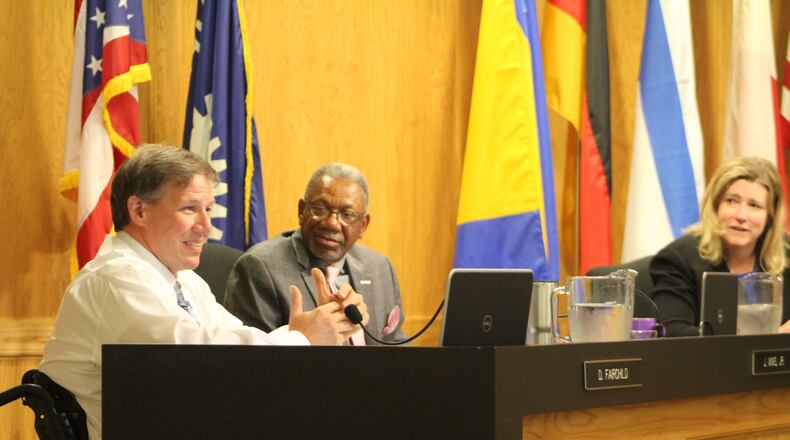Fairchild said the city’s budget process recently started for next year, and he wants the city to prioritize funding neighborhood redevelopment.
Speaking at a recent city commission meeting, Fairchild told the mayor she has led the city through difficult times and achieved difficult goals.
“I know if you identify neighborhood development as the next difficult thing to overcome, we will be well on our way to safe, vital neighborhoods,” Fairchild said.
But Dayton Mayor Nan Whaley for the second time in a week derided Fairchild’s comments.
“Thank you for that campaign speech,” she said.
Later, Whaley told this newspaper the city is already doing most of the things Fairchild proposed and is heavily focused on improving residential neighborhoods.
“I did not hear anything new in there,” she said. “It’s a campaign speech.”
MORE: Fairchild calls for ‘fresh look’ at blight; Mayor Whaley asks where he’d find the money
The city has done a good job tackling challenges related to pre-K education, the opioid crisis and the redevelopment of the Dayton Arcade, and it’s time for the city to focus on building up residential neighborhoods, Fairchild said.
The city’s focus on the core has paid off, and the city needs a “tactical plan” with creative strategies for improving housing, Fairchild said.
Fairchild proposes directing the department of planning and community development to spend three months doing a comprehensive review of the policies and best practices other Midwest cities use to address blight, stabilizing strategic properties and invest in residential neighborhoods.
Fairchild wants the city to develop criteria to best evaluate residential neighborhoods and try to identify specific Dayton neighborhoods to prioritize.
He said he wants the city to host public input sessions, refine recommendations, present those to the planning board for approval and then have the city commission vote on the selections.
Fairchild also said he would like the city to fund incentive plans for city employees to live in Dayton.
This newspaper reported that in 2014 about 37 percent of city employees lived outside of Dayton. The percentage of employees living in the city plunged after a residency restriction was struck down by the courts in 2009.
“Our audacious goal should be that our city is our employees city of choice,” Fairchild said.
MORE: 37 percent of workers left city of Dayton after residency rule falls
Fairchild also proposed a financial incentive program to encourage people to live in Dayton and homeownership programs aimed at first-time homebuyers and down payment assistance.
He also supports funding renovation and rehabilitation programs, especially focused on external improvements or safety upgrades.
The city can utilize volunteers in new ways, Fairchild said, such as cleaning up vacant properties to improve safety and attractiveness, and the city should try to enhance its DYI home repair program.
But Mayor Whaley said the city has provided homeownership incentives in the past, and they were not effective. She said the city is limited in some of the incentives it can offer its employees.
She said it’s frustrating that the city is not able to do more to help neighborhoods, but it all boils down to funding.
“Neighborhoods are the entire city,” she said. “We are doing the work. We continue to assess. We continue to look at best practice.”
Commissioner Chris Shaw said some of Fairchild’s ideas sounded interesting, but wished he would actually share them with commissioners instead of quickly reading prepared comments from the dais.
Shaw said it would have been helpful if Fairchild made copies of his remarks and passed them out or met and had a conversation with his peers.
Shaw said they have plenty of opportunities to discuss the budget and strategies and ideas for blight removal and neighborhood improvement, but so far, that’s not happened.
He said tackling blight is a money issue, and he wants to hear Fairchild’s ideas for where to cut to free up funds for demolition and other improvement activities.
“We are tasked with making very difficult decisions,” he said. “He continues not to communicate.”
WATCH: President Trump calls Dayton police officers ‘exceptional’ in Medal of Valor ceremony
About the Author

